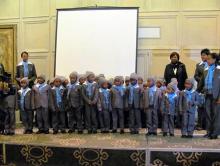National Immunization Days Launched
Harare, 18 June 2012 -- The Honourable Minister of Health and Child Welfare Dr. H. Madzorera, in conjunction with City Health Departments, UNICEF, WHO, and other partners, launched the National Immunization Days (NIDs) on 18th June in Harare.
NIDs are selected days when measles and polio vaccines as well as vitamin A supplements are given to children between the ages of 0 – 59 months and are extra doses which supplement and do not replace the doses received according to routine immunizations.
The campaign will be held from 18—22 June at all health care facilities, outreach points, and other centers agreed upon by communities. NIDs are routinely carried out every 3—4 years assuming vaccination coverage has been maintained at 80% and above, to provide an opportunity for children who did not make antibodies when they were vaccinated, and to give a chance to those children who missed their routine vaccinations.
This year the campaign targets 1.9 million children in the 0—59 months age group and includes the polio vaccine for additional protection since polio was reported in some countries close to Zimbabwe, and in line with the WHO Regional Director’s call to kick polio out of Africa.
Speaking at the occasion, WHO Representative, Dr C. Mandlhate, said NIDs are very important days because they aim to contribute to polio eradication and measles elimination. She said the extra doses of measles and polio vaccines given to all children in the specific age group at the same time will create nationwide immunity against measles and poliomyelitis as well as removing the risk of children who have no antibodies to fight measles and polio from contributing to their spread.
Dr Mandlhate said that although Zimbabwe has been polio free for close to a decade, the MoHCW should not relax because the danger of importing polio is always lurking since there are some countries in the African region which still have polio. “We should never relax as Wild Polio Virus and Vaccine Derived Polio Virus are still circulating in the world including Africa making our population still vulnerable,” said Dr Mandlhate.
The Minister of Health and Child Welfare Dr Madzorera said the campaign aims to reach all targeted children by going in to the communities. Dr Madzorera urged all care givers to understand their obligation in ensuring that every targeted child is immunized.
The Honorable Minister also acknowledged the support they have received from the Japanese Government , technical and logistical support from WHO and from the Measles Partnership which include WHO and UNICEF. He also said the Ministry of Health and Child Welfare will introduce 2 new vaccines in the next 2 years—the pneumococcal and rotavirus vaccines as part of its duty to ensure child illness and deaths due to vaccine preventable diseases cease to be public health challenges.
This year’s launch was attended by women and children from the Apostolic sect to show their support of the immunization programme. Members of the sect are traditionally known for refusing vaccinations and their participation is a positive sign which will hopefully increase coverage figures.










